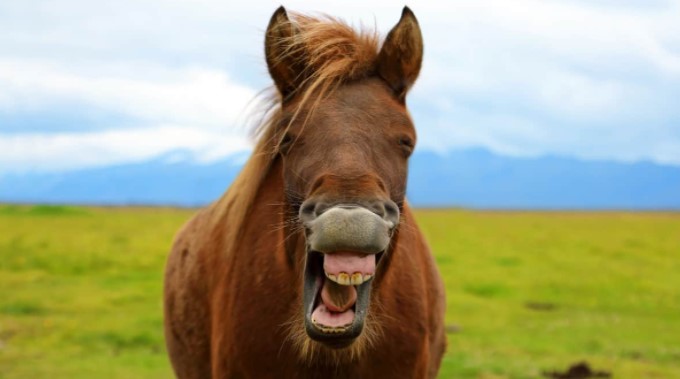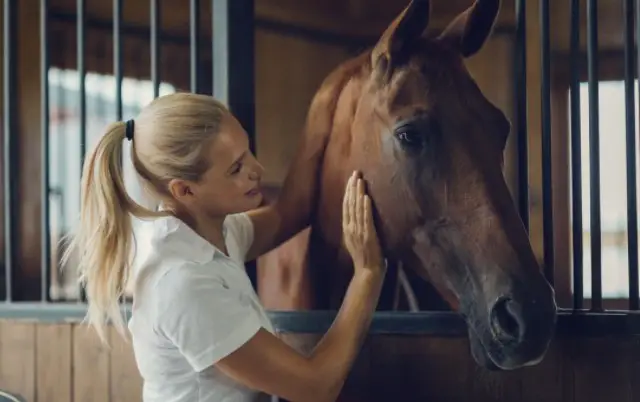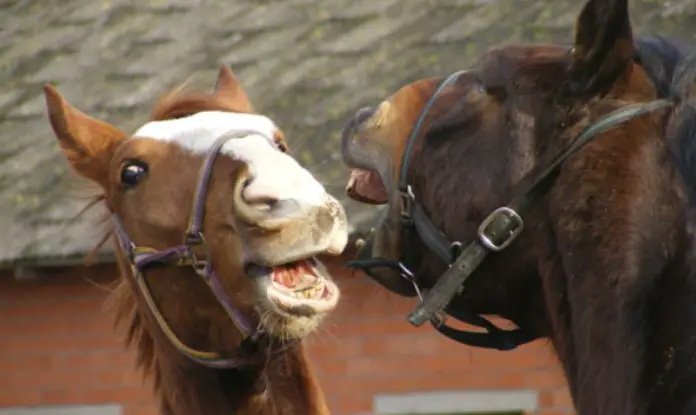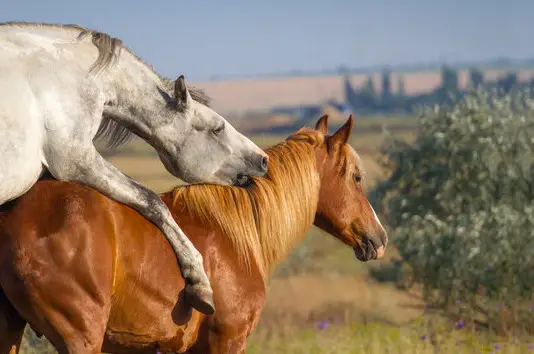What does a horse say when he greets you? Or when he approaches another? Or see a predator? It neighs!
Owning a horse is no doubt an enjoyable experience. However, if you are new to the sport, you may not understand why your horse neighs. Seeing your horse neigh might make you wonder if your horse is unhappy or if something else is the matter.
Understanding the meaning behind a horse’s neigh means you can adapt your own behavior to their “language” and train or discipline your horse better.
Moreover, your horse’s neighs can be crucial in identifying the reason that your equine friend is neighing. Learning what the different whinnies mean will help you address issues related to whinnying before they become significant problems.
The correct information, after all, is the first step toward successfully understanding your horse’s neighs. To better understand your horse’s neighing behavior, check out our article on the topic.
The Reason Behind the Neighing of Horses
Also called “whinny,” neigh is a horse vocalization that sounds like a squeal at the first and nicker at the end. The duration of most neighs is about 1.5 seconds that can be heard from as far as half-mile.
Neighing is a horse’s basic innate sound that helps him communicate with other horses and often with their human family members. While these neighs may be puzzling to you, in reality, your horse might be trying to talk to you. Although horses can’t speak words, they can still use their voices for communicating.

If you have more than one horse in your pasture, you may hear them nicker with each other. It’s hard to decipher what they are trying to tell each other. But researchers have studied the sounds and believe nickers are used for social purposes.
Whinnying is often used to alert other horses that another animal is nearby. This can also mean that the horse desires another horse to notice him or court him. For example, a mare might whinny when she wants her male partner’s attention. A mare who whinnies repeatedly may be asking for her male partner to come over so they can mate.
In addition, there are plenty of other factors that might cause your horse to neigh. Keep reading as we explain these reasons in detail below.
Conveyance of Feelings
A horse is very much in tune with its natural environment. Therefore, horses neigh to gather information about sounds, smells, and movements in the vicinity. Usually, they never convey their emotions like humans do by using verbal signals for communication.

Like other equine vocalizations such as snorting, nickering, etc., neighing is meant to greet and collect information.
Anyone who has ever heard the neighs of horses understands that it is pretty situational. Some may say that their horses “neigh” with excitement, some may say they “neigh” to warn others of danger, and some explain their horses will even greet each other with “neigh.”
Plus, when a horse comes to learning, horses are surprisingly forward learners. They actively watch for human signals, comprehend body language, and are fast to make connections. If you’ve ever caught your horse neighing when the phone rings or leaning in when passing a house where he once received apples at the kitchen door, you’ll know what we mean.
Therefore, one of the best ways to get a personal insight into your horse’s life is by observing them daily. By carefully watching their body language and listening to their vocalizations, you will begin to understand how they are feeling at any given time.
Call Other Horses
Horses can be very social animals, so they might feel lonely if they cannot bond with other horses. Like the rest of us, horses also need companionship and need to form bonds with other horses. This is particularly true if you keep multiple horses together because it increases their happiness.

Assuming you keep multiple horses together, your horse may begin to neigh when he sees or hears another horse so that his friend will come over. This behavior is all about companionship and getting quality time with other horses. If your horse seems lonely in his stall when he hears another horse neighing, this may be the reason why.
Stallions also use the neigh to threaten other stallions and ward off potential rivals during mating season. Also, they do so to let their intended mate know he is nearby. On the other hand, mares become more protective due to their foal’s neigh in case of danger from other horses.
Horses can decipher between the neighs of different horse breeds because each has its own unique frequency. In its early years, a horse could not distinguish between similar-sounding neighs. However, it is easy for a stallion to distinguish the neighs of domestic horses from wild horses.
Express Distress
As if horses didn’t have enough vocalizations to tell you their mood, neighing can also mean something’s off. For example, when a horse is anxious, the horse may also become fidgety. If the horse begins to tremble or rock back and forth, these actions may indicate pain rather than anxiety.
A high-pitched neigh may also occur in response to an initial encounter with a predator. Although such neighing may distress the other horse, it’s typically a non-urgent call for sympathy. Plus, if the horse has been startled or frightened by something, it might express this feeling by neighing.
Furthermore, an alarming neigh can signify a threat to a horse’s safety. A neigh of alert often prompts the animal to take evasive action. However, a moderately distressed individual will first emit a weak alarm noise before a full-throttle call for help.
If a horse is exhibiting these signs, you should help him relax. However, if the horse is unfamiliar with you, merely approaching can cause fear in him. To approach an anxious horse, focus on keeping your movements slow and deliberate.
Need for Mating
A horse’s neigh can also play a significant role in establishing social hierarchies and functioning to attract mates. Like many other animals, horses, too, have developed the art of wooing. After all, who could blame them when there are docile mares to impress?

Just like humans – females’ preferences also vary. Therefore, in some cases, that would be for a stallion not found in their herd or barn. That’s why a stallion may try to attract a mare’s attention with a soft and deep neigh.
If he’s making a lot of noise and trying to interrupt her, he might be showing signs he likes her.
Show Enthusiasm
On the flip side, horses also neigh when they are in a confident mood. It can make it hard to interpret what they are saying.
A confident and bold-looking horse will be pacing or strutting rather than holding its head down, toes pointed in, tail lying down, and ears pulled back. It will appear alert and well-groomed, not dragging its feet as if it is ready to lie down or something is bothering it.
You should be able to tell that the horse is alert and focused on you as you approach because of its confident stance and glint in its eye. When the horse shows a bold look, you might see his ears pricked forward.
Another way to tell the difference between neighs of fear and neighs of confidence is by their volume. Fear-induced neighs are high-pitched and loud, while confident neighs are bold ones.
Did You Know That Every Herd of Horses Has Similar Neigh Sounds?
The neighing of horses – or equine vocalizations – has regional accents comparable to humans. It sounds pretty similar to other neighs from horses of the same herd when a horse neighs. But it is still possible to distinguish between them.
It shows that neighing is a learned behavior that horses learn from their herds. Apart from the herd’s individualism, horses build their neighs as a personal identification tool. Therefore, every herd of horses will have a quite common neighing sound that serves for the herd’s identity.
With that said, you will most likely note the differences in neighs of various horse breeds. Additionally, when it comes to the stallion’s and mare’s neigh, you will hint at a bit of grunt specific to the stallion’s call only.
Wrapping Up: Why Do Horses Neigh?
You might feel confused or frustrated if your horse neighs. Most horses will neigh to each other when interacting, but sometimes they might neigh without any provocation.
It is believed that the neighing was first confused with the communication of fear. However, it is now accepted that this communication has a dynamic character.
If you have a horse who is distressed by noises, it may be prone to nocturnal neighing. The sources of their distress can range from noise and intrusion into the horse’s personal space. It can also point out the natural fear associated with a lack of understanding of reacting to new stimuli.
Earlier, we have explained all the possible reasons causing your horse to neigh. However, if your horse neighs continuously, you should get your horse checked by the veterinarian to know the underlying causes.
